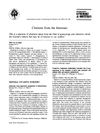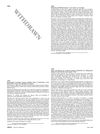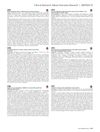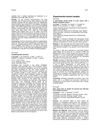 66 citations,
June 2021 in “Journal of The American Academy of Dermatology”
66 citations,
June 2021 in “Journal of The American Academy of Dermatology” Baricitinib is effective and safe for treating severe alopecia areata.
 47 citations,
December 2006 in “Therapy”
47 citations,
December 2006 in “Therapy” The dietary supplement helped increase hair growth in women with hair loss.
 3 citations,
June 1995 in “International Journal of Gynecology & Obstetrics”
3 citations,
June 1995 in “International Journal of Gynecology & Obstetrics” Laser laparoscopy effectively reduces pelvic pain in women with mild to moderate endometriosis and is safe to use.
 63 citations,
May 2011 in “Clinical cancer research”
63 citations,
May 2011 in “Clinical cancer research” The topical inhibitor CUR61414 was not effective in treating basal cell carcinoma in human trials.
 July 2023 in “Journal of Ethnopharmacology”
July 2023 in “Journal of Ethnopharmacology” Amla fruit syrup improved hair growth and satisfaction in women with hair loss without significant side effects.
 May 2023 in “Journal of Cosmetic Dermatology”
May 2023 in “Journal of Cosmetic Dermatology” Using platelet-rich plasma, basic fibroblast growth factor, and minoxidil together significantly increases hair count and growth rate in people with hair loss.
 4 citations,
February 2024 in “The Journal of Urology”
4 citations,
February 2024 in “The Journal of Urology” Adding hormone therapy to radiation improves survival for high-risk prostate cancer recurrence but has side effects.
 69 citations,
April 2010 in “Dermatologic Surgery”
69 citations,
April 2010 in “Dermatologic Surgery” Bimatoprost is a safe and effective treatment for making eyelashes longer, thicker, and darker.
 37 citations,
December 2019 in “Giornale italiano di dermatologia e venereologia”
37 citations,
December 2019 in “Giornale italiano di dermatologia e venereologia” The Italian guidelines offer advice for diagnosing and treating alopecia areata based on expert opinion and limited clinical trial evidence.
 December 2023 in “International Journal of Biomedicine”
December 2023 in “International Journal of Biomedicine” Topical finasteride might help with male hair loss with fewer side effects than pills, but more research is needed.

The treatment was ineffective in humans.
 June 2024 in “Dermatology and Therapy”
June 2024 in “Dermatology and Therapy” Baricitinib improves quality of life and reduces anxiety and depression in severe alopecia areata patients with hair regrowth.
 1 citations,
January 2009 in “Drug delivery system”
1 citations,
January 2009 in “Drug delivery system” Anti-aging treatments like hair transplants, minoxidil, and finasteride effectively promote hair growth.
 165 citations,
August 2013 in “Lasers in Surgery and Medicine”
165 citations,
August 2013 in “Lasers in Surgery and Medicine” Low-Level Laser Therapy is effective and safe for hair growth with minimal side effects.
 27 citations,
February 2017 in “Clinical, Cosmetic and Investigational Dermatology”
27 citations,
February 2017 in “Clinical, Cosmetic and Investigational Dermatology” New compounds were found to help increase hair growth and decrease hair loss.
 22 citations,
March 2000 in “Clinics in Dermatology”
22 citations,
March 2000 in “Clinics in Dermatology” Many treatments for hair loss lack proper testing and FDA approval, so their effectiveness is uncertain.
 4 citations,
December 1997 in “Clinical Endocrinology”
4 citations,
December 1997 in “Clinical Endocrinology” Spironolactone may help reduce hair loss in androgenic alopecia.
 20 citations,
December 1997 in “Clinical Endocrinology”
20 citations,
December 1997 in “Clinical Endocrinology” Spironolactone may help reduce hair loss in androgenic alopecia.
 14 citations,
June 2021 in “Expert Opinion on Therapeutic Patents”
14 citations,
June 2021 in “Expert Opinion on Therapeutic Patents” New patents show progress in developing drugs targeting the Wnt pathway for diseases like cancer and hair loss.
 4 citations,
September 2020 in “BioMed Research International”
4 citations,
September 2020 in “BioMed Research International” Timosaponin BII, a plant extract, was found to promote hair growth in mice, similarly to minoxidil.
 February 2021 in “Dermatologic Therapy”
February 2021 in “Dermatologic Therapy” Injections improve hair growth, density, and thickness in women safely.
 November 2023 in “Research Square (Research Square)”
November 2023 in “Research Square (Research Square)” Combining calcipotriol and PRP is most effective for treating Alopecia Areata.
 1 citations,
April 2019 in “Journal of Investigative Dermatology”
1 citations,
April 2019 in “Journal of Investigative Dermatology” Dupilumab is effective and safe for treating moderate-to-severe atopic dermatitis in adolescents.
 1 citations,
July 1997 in “Inpharma Weekly”
1 citations,
July 1997 in “Inpharma Weekly” Finasteride improves hair growth and satisfaction in men with male pattern baldness but may cause sexual side effects.
 April 2016 in “Journal of The American Academy of Dermatology”
April 2016 in “Journal of The American Academy of Dermatology” Dutasteride is more effective than finasteride for hair growth with similar side effects.
 April 2018 in “The journal of investigative dermatology/Journal of investigative dermatology”
April 2018 in “The journal of investigative dermatology/Journal of investigative dermatology” Higher fluence in hair removal damages hair follicles more, while lower fluence mimics natural hair regression, with long-term IPL treatments effectively reducing hair.
 38 citations,
June 2015 in “Expert Opinion on Therapeutic Targets”
38 citations,
June 2015 in “Expert Opinion on Therapeutic Targets” Blocking the prolactin receptor might help treat various diseases, but more research is needed.
 1 citations,
June 2023 in “Radiation oncology journal”
1 citations,
June 2023 in “Radiation oncology journal” Low-dose radiation therapy may improve brain function in some Alzheimer's patients and is generally well-tolerated.
 July 1997 in “The Lancet”
July 1997 in “The Lancet” A new protein linked to Alzheimer's was discovered, and a hair loss treatment showed effectiveness but had some sexual side effects.
 October 2004 in “Radiotherapy and oncology”
October 2004 in “Radiotherapy and oncology” Active vitamin D3 might protect hair follicles from radiation damage.






























